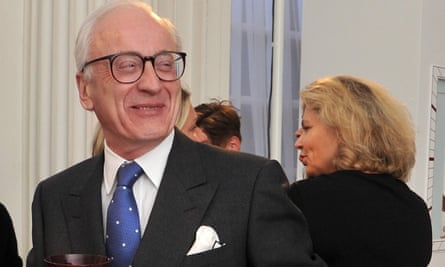They were the lucrative deals that epitomised the “VIP lane” set up by Boris Johnson’s government during the Covid pandemic, which gave priority for personal protective equipment (PPE) contracts to people with political connections.
Peter Gummer, a former PR boss who has been Tory peer Lord Chadlington since 1996, had smooth access at his fingertips. The erstwhile adviser to John Major has “close personal friendships with many senior Conservative party politicians”, he has said, and as president of the Witney constituency association in the Cotswolds is “close friends” with its most notable MP: David Cameron.
When the pandemic reached Britain early in 2020, Chadlington was a director and shareholder of a company registered in Jersey, majority-owned and run by David Sumner, a serial entrepreneur then based in Dubai.
During the first lockdown, Chadlington embarked on an effort to introduce a Sumner company to supply PPE. He contacted Cameron first, texting him at 7.13am on 19 April 2020. Cameron texted back that his own close friend Andrew Feldman, whom he had appointed to the House of Lords when he was prime minister, was working for the government on PPE procurement.
Chadlington then texted Feldman, who said to get in touch on his new Department of Health and Social Care email address. By 8.04am, less than an hour after his initial text to Cameron, Chadlington was emailing Feldman, copying in Sumner, to make a direct introduction.
“David,” Chadlington wrote, addressing Sumner. “This is my friend Andrew Feldman. He can help you with PPE we discussed this morning. Drop me off chain. Peter.”
Sumner then sent Feldman an offer to supply PPE. Feldman forwarded it to civil servants operating the VIP lane, telling them: “An interesting offer from David Sumner who was introduced to me by Lord Chadlington.”
A week later, the DHSC awarded Sumner’s UK company – a small, loss-making healthcare staff agency, SG Recruitment – a £24m contract to supply coveralls. A month later the government gave the company a second contract, worth £26m, to supply hand sanitiser.
The full story of how this £50m example of the government’s VIP lane commissioning turned out is only becoming clearer now. It was far from a success. Despite the government contracts, SG Recruitment, later renamed, went into liquidation in December 2023. The liquidators have just issued their official report. It confirmed for the first time that the DHSC entirely rejected as “unusable” the PPE supplied under the first contract, and has put in a claim for the full £24m.
However, all the money has gone from the company. It went bust owing £1.1m in taxes to HMRC. The liquidators found that payments were made out of the company to connected businesses and “unknown third parties”, some apparently overseas. The main bank account was closed in December 2021. Sumner transferred ownership of the company in March 2023 to a woman the liquidators said they believed to be a Philippine national, whom they were unable to contact. The sum total of money found was in an overseas transfers account: £5.
The parent company, Sumner Group Holdings (SGH), of which Chadlington was a director then chair, went into liquidation earlier, in 2022. Chadlington’s lawyers told the Guardian in June 2023 that when he put the Sumner companies forward for PPE contracts, he was unaware they had financial difficulties.
“He had no information which gave rise to financial concerns regarding SGH and/or SGR in April 2020,” they said.
But the Guardian has seen evidence that indicates Chadlington was made aware in January 2020 that some SGH creditors were pushing the company, and Sumner personally, to repay at least $18m, claiming that they were owed in total approximately $30m at that time.
There is also publicly revealed evidence that the Sumner companies were under financial pressure before Chadlington made his introduction. SGH was put into liquidation by a consultant, Douglas Geertz, whose fees were never paid. A 2022 court judgment noted that SGH’s chief operating officer told him in the summer of 2018: “I regret that SGH finds itself in very challenging financial circumstances.”
In December 2019 other creditors had sued another Sumner group company in the British Virgin Islands for £2m. A published court judgment noted that: “Relations [with these creditors] deteriorated in late 2018 and collapsed completely in September 2019.” The £2m appears never to have been paid.
SG Recruitment, the UK company, had made losses of £700,000, and was financially reliant on SGH, in the year before it was awarded the PPE contracts.
Despite all this, Chadlington used his connections to contact senior Conservative figures from April 2020, including Matt Hancock, then the health secretary, promoting Sumner as a supplier of PPE. Chadlington encouraged Sumner to secure contracts, messaging him after the approach to Feldman with “Brilliant. Keep going” and “Excellent. Looks like you have an inside track.”
Chadlington has twice been investigated by the House of Lords commissioner for standards for his approach to Feldman, under a section of the conduct code that says peers “must not seek to profit from membership of the House”. Chadlington did not tell either investigation that he sent the email introducing Sumner to Feldman. He told the commissioner’s second inquiry in August 2023: “I did not facilitate an introduction.” He was cleared of any misconduct both times.
Chadlington has now disclosed that email introduction and the text messages he exchanged with Cameron, Feldman, Hancock and Sumner, after he was asked to provide evidence to the Covid-19 public inquiry. It published the messages and his witness statement in May this year.
Chaired by Heather Hallett, the inquiry is considering the VIP lane as part of its examination into how the government handled the pandemic. The Covid Bereaved Families for Justice (CBFFJ) group, which represents relatives of 7,500 people who died of Covid, is an inquiry core participant. The CBFFJ’s lead lawyer, Pete Weatherby KC, has been very critical of the VIP lane and highlighted SG Recruitment as a key example. The inquiry is looking at how Chadlington’s introduction affected the contracts being awarded, but not at whether the PPE was ultimately delivered.
Johnson’s government’s operation of the VIP lane has been widely criticised for prioritising politically connected companies ever since its existence was leaked in October 2020. As the government frantically scrambled to fill depleted stockpiles, it spent £12bn on PPE in 2020-21, of which almost £9bn had to be written off because it was substandard, defective, past its use-by date or overpriced. The UK Anti-Corruption Coalition has pointed to evidence that VIP lane contracts cost £3.8bn, almost 30% of the total, and delivered more expensive and more unusable PPE than non-VIP contracts. Hancock and other ministers have defended the VIP lane, arguing that it enabled the government to prioritise credible offers.
Chadlington was a director of SGH from 2018, then was appointed chair in April 2020, starting the role in June 2020, his lawyers said. In his statement to the Covid inquiry, Chadlington said that it was later, “within a few months” of becoming chair, that he and his fellow SGH directors did become “increasingly concerned” about the way the business was being run.
“We were concerned about unpaid wages and fees, contracts falling through, and increasingly vague and confusing responses from Mr Sumner and the management team to questions from the SGH board, as well as Mr Sumner’s apparent overoptimism about the state of the business.”
Despite this, as late as April 2021, Chadlington was enthusiastically supporting Sumner to bid for a further government PPE contract, telling a fellow director that Sumner was being asked to quote “on a huge (and I mean huge!) contract” to supply gloves. That showed that the government “have no doubts about our legitimacy”, he wrote to the director. The same day he messaged Sumner, encouraging him to publicly market the company as a government supplier. Ultimately the company was accepted as a possible supplier of gloves, but no contracts were awarded.
Chadlington has repeatedly said he did not personally benefit from the PPE contracts, telling the Lords commissioner’s first inquiry in 2022: “I received no commission, bonus or direct financial benefit from the two contracts awarded to SG Recruitment Limited.”
The Guardian has seen SGH filings in Jersey showing that in the year after the award of the contracts, Chadlington was issued with 27.5m new shares in the company, which he appears not to have paid for. Chadlington’s lawyers said the shares were not a bonus, they were “growth shares” issued to him and the other non-executive directors after he became chair and reorganised the board.
Three months after supporting Sumner to bid for the PPE gloves deal, in July 2021 Chadlington resigned from SGH. All the non-executive directors were owed fees, he has said, and they resigned at the same time. Chadlington was owed $100,000 director’s fees when SGH went into liquidation, almost $350,000 in consultancy fees, and a $180,000 loan.
Sumner, who is believed to be in the Philippines, replied to the Guardian’s questions by email. He said the DHSC reduced the amount of hand sanitiser bought under the second contract, paying £16.6m rather than £26m, so £40.6m for the two contracts. Sumner said the company had the required commercial and regulatory experience to supply PPE and delivered in accordance with the contracts, and that profit margins were “circa 15%”, although he did not provide evidence for this. He did not answer questions about the payments made out of SG Recruitment, or the closing of its bank accounts in 2021, but said that all money was “accounted for properly”.
In relation to its liquidation, he said the company “was sold to a third party” almost a year before, “so it is very disappointing that the new owners had not made a success of the company”. He said he did not accept Chadlington’s criticisms of his management. Of the SGH liquidation and questions about the $30m debts creditors were claiming, Sumner said: “SGH Jersey was not a contracting party and so not relevant.”
After Chadlington provided his messages to the Covid inquiry, the Lords standards commissioner has since opened a third inquiry. The possible conduct breaches are the same as previously, but also this time whether he failed to act on his “personal honour”. That appears to be a question of whether he was not fully transparent with the two previous inquiries.
Chadlington’s lawyers responded to the Guardian’s questions by saying that he did not act in any way improperly “in connecting Mr Sumner with Lord Feldman”. They said it was up to the government, not Chadlington, to carry out due diligence on SG Recruitment.
In relation to questions about his knowledge of SGH’s financial position, and the $30m debts, when he introduced Sumner for government PPE contracts, the lawyers said: “Our client understood that while the company had faced some cashflow issues, these were common to most startup businesses.” He only became concerned about SGH’s viability later after he became chair, in particular by the beginning of 2021, they said.
In his witness statement to the Covid inquiry, Chadlington said: “While I was not involved in the awarding of contracts for PPE, I was proud that, by making the necessary introductions, I had played a very small role in helping the country during a national emergency.”
A DHSC spokesperson said after Labour was elected to government, it has sought to recover money from PPE contracts that did not deliver. He did not answer questions about SG Recruitment, saying the DHSC cannot currently discuss specific companies.
A spokesperson for the CBFFJ said: “While our loved ones were dying, often without the PPE that could have protected them, the system enabled political insiders to use their connections to secure public contracts. It is devastating to learn that the PPE from one of SG Recruitment’s contracts was rejected as unusable. This is exactly the kind of evidence the Covid inquiry should be examining. Bereaved families deserve answers. The public deserves answers. Justice means getting to the bottom of how this happened, who benefited, and who should be held accountable.”










